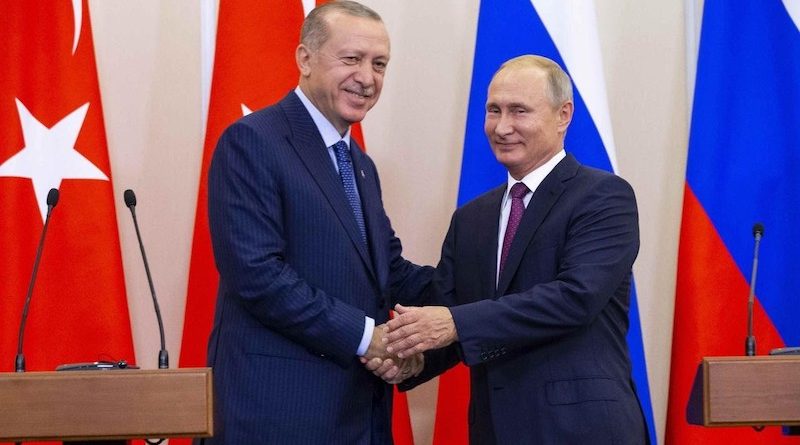Russo-Turkish Rapprochement: Not Without Historical Precedent
By Samuel Rogers, MALD Candidate 2022 at The Fletcher School at Tufts University
On January 12th, Russia and Turkey engineered a fragile cease-fire for Libya’s ongoing civil war between its two major factions. Although the cease-fire was violated quickly after its brokering, negotiations between Russian, Turkish, and Libyan delegations in Moscow mark what has been a growing partnership between Ankara and Moscow on issues of regional strategy. Other significant instances of Russo-Turkish cooperation include the establishing of their “Safe Zone” in Syria on October 22nd, 2019 and, of course, Ankara’s purchasing of the S-400 missile systems. In both Libya and Syria, Ankara and Moscow have found themselves on opposing sides (if unofficially in Libya) and yet have demonstrated significant resolve to cooperate in realizing strategic and security goals. Although this rapid thawing of relations between the two countries may seem surprising, it is not without precedent.
The historical rivalry between the Ottoman and Russian Empires has generally colored conceptions of Turkey and Russia as natural enemies. Russian territorial ambitions and the declining Ottoman influence in the Balkans and the Caucasus led to no fewer than 12 wars between the two powers, most notably the bitter struggle between the countries during World War I. It is true that these conflicts have informed Russian and Turkish policies in the latter half of the 21st century. However, there is also noteworthy historical precedent for Turco-Russian cooperation.
When rebel Ottoman governor Muhammad Ali Pasha of Egypt threatened the Ottoman government in Istanbul in 1831, Russia rallied to its defense by deploying its military to Turkey. Tsar Nicholas I capitalized onsegued this demonstration to secure a decade-long military alliance between the two empires. Russo-Ottoman negotiations regarding a more permanent alliance continued to be entertained over the following decades right up until World War I. However, the most significant historical instance of Turco-Russian collaboration occurred during the Turkish War of National Independence (1919–22) when the Bolshevik government provided crucial financial and material support to the Turkish National Forces. This aid was critical in allowing Turkish forces to defy British, French, and Italian partitioning of Anatolia and the subsequent establishment of the modern Turkish state. Soviet aid was considered so important to Turkey’s War of National Independence that Mustafa Kemal’s 1928 monument to victory includes a depiction of the first Soviet ambassador to Turkey, Sergei Aralov.
Friendly relations between Russia and Turkey endured well into the 1930s and were seen by both sides as a natural alignment of their states’ security interests against Western Europe and the US. However, Stalinist territorial ambitions and post-war demands on Turkey again propelled it to seek allies in the West and to join NATO in 1952. However, despite tensions and Ankara’s distrust of Soviet leadership, Moscow was not always unfriendly to Ankara during the Cold War period. In 1974, the USSR notably declared its support for the Turkish invasion of Cyprus. As Soviet influence and capacity waned and its policies became less confrontational towards Turkey, the need for Western alliances and protections lessened. Since 1991, the collapse of the Soviet Union has led to a dramatic reconfiguring of the regional positioning and influence of Turkey, again providing space for Russo-Turkish cooperation.
During the G20 summit in Buenos Aires on December 1st, 2018, Putin announced that “Turkey has shown one more time that it follows an independent foreign policy and is our trusted ally.” Increasing efforts by Ankara to assert its policies independent of US and EU influence have continued to draw Russia and Turkey together. With many of its historical points of contention no longer determining factors, Russia and Turkey are increasingly seeking economic and military cooperation. Although the current means and manifestations of Russo-Turkish rapprochement has been greeted with surprise and critique in many circles, it is clear that this cooperation is not something entirely new. It begs the question of whether Turkey and Russia’s cooperation is circumstantial and simply part of an long-established historical ebb and flow, or whether the arrangement could be more lasting.
This piece was republished from Medium.

